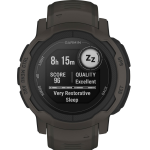The Foo Fighters rocker, filmmaker and now author, will have to shamefully explain why he ticked “yes” next to the question asking incoming visitors if they have any criminal convictions. Grohl relives the “embarrassing” incident which blemished the Nicest Guy In Rock’s record in his upcoming memoir The Storyteller: Tales Of Life And Music. It was the 2000 Big Day Out travelling circus and Grohl and his Foo Fighters drummer brother Taylor Hawkins had rented mopeds on the Gold Coast to explore the local beaches and ride to the festival site. After their set – and a few beers and whisky shots – Grohl stupidly decided to head back to the hotel on the scooter and was pulled over at a RBT checkpoint where he blew 0.95. With only his Big Day Out laminate for identification, he was thrown into a jail cell alongside snoring drunk and disorderly punters, some who had watched him play in front of 50,000 fans just hours before. The rocker returned to the Gold Coast mid-tour to face court, after buying a $700 suit and tie, and pleaded guilty to the drink driving offence. He copped a $400 fine and a conviction. “I still answer for that every time I come down; every time I have to tick that f … ing box,” Grohl says.“They pull me aside at the airport and I have to tell them the story and … they laugh, and then I go and pick up my bag. It’s f … ing embarrassing.” Having learned that important life lesson, and writing about it in a book, he may suffer further bouts of shame issuing the “don’t drive and drive” warning to his three daughters Violet, Harper and Ophelia when it comes time to give them driving lessons in the Grohl mini-van. While his fabled rock’n’roll life with revered punk band Scream, then Nirvana and founding Foo Fighters after Kurt Cobain’s death take centrestage, The Storyteller’s yarns are rooted deeply in his love of family. His schoolteacher mum Virginia – the author of the bestseller From Cradle To Stage about the experiences of mothers raising future rock stars – is the hero of the piece, fostering her son’s music passion through his teen years and supporting his decision to drop out of school and go on the road. He credits her DNA and that of his journalist father James – “both brilliant musicians with a great ear” – for why he got the music bug, and now nurtures it in his own children, with the two eldest having joined him on stage and pursued their love of singing and playing instruments at home and school. Many of his stories directly involve his and wife Jordyn’s daughters, or are filtered through their eyes, such as their tween casualness about meeting the legendary Paul McCartney or being starstruck into shyness when Joan Jett came to stay and write songs with their dad. And read them a bedtime story. “Paul has a very clear understanding of his place in this world and what he means to everyone and upon meeting him, his initial reaction is to disarm you, to remind you that we’re all just human beings here, you know?” Grohl says. “I appreciate and am entertained by the mythology of it all. But with everything I do, whether it’s being in the Foo Fighters or making the Sound City and Sonic Highways documentaries, I’m trying to humanise this rock’n’roll thing. “The humanity and the relatability is very important to remember because, at the end of the day, while I love playing stadiums as much as the next guy, come six thirty in the morning, I’m packing lunches and driving a f … ing mini-van, like I’m still doing every day.” Rock star Grohl has made herculean efforts to fulfil his dad duties. Like the time he rescheduled a Perth stadium show in 2015 so he could make the annual father-daughter dance. He flew off the stage after the Adelaide show, caught a flight to Sydney and onto LA, went to the dance, ate some dodgy salad, endured 20 hours of flights with food poisoning to get back to Perth and play for two and a half hours. “But the worst part was it was during that f … ing ebola outbreak. They had those ‘Do you have any symptoms?’ cards. I had every single one. And I was terrified that they were going to put me in a room with people who had ebola,” he says. “I remember thinking at the time, ‘I can’t miss this dance’ and then thinking after I was so glad that I made it because at some point in their lives, I’m going to play this f … ing card, it’s my ace in the hole, man. “I was driving Harper somewhere and she asked what the longest flight I’d been on and I said ‘Actually, last year when I did this trip to take you to the dance.’ “And she said ‘You didn’t have to do that.’ She was quiet for a minute and then she said, ‘Actually, yes you did.’ ”As anyone who has enjoyed Grohl’s onstage ramblings at a Foo Fighters gig can attest, he can spin a yarn.He makes you jealous with his fanboy elation and incredulity when he meets or plays with his heroes; McCartney, Motorhead’s Lemmy, AC/DC, Little Richard … you name them, Grohl’s got a story. His memoir also captures both the exhilarating freedom and abject poverty of running away to join the rock’n’roll circus, starting out with a per diem of $7.50 with Scream which doubled to $15 when he became Nirvana’s drummer in the months before they ushered grunge into the mainstream with their Nevermind album in 1991. “That was success to me then, I could buy Marlboros instead of the generic brands,” he says.“There’s a theme that runs through the book and that’s survival. You do what you have to do to get by.”And he addresses the ghosts of those who didn’t survive, notably his Nirvana bandmate Kurt Cobain and his best friend Jimmy Swanson. Grohl’s description of his grief after Cobain’s death in April 1994 – and its lingering aftershocks almost 30 years later – is heartbreaking. He shares how he collapsed in tears and howls and emotional agony the month before, when Cobain overdosed in Rome and someone called the drummer to tell him “He’s gone, Dave.” Five minutes later, the phone rang again – Cobain was in a bad way in hospital but would live. That emotional confusion messed up his process of grieving forever; when his Nirvana brother took his life 36 days later, Grohl struggled to exorcise the weight of his profound sadness. And still does. “That chapter was the last one I wrote because I was afraid of it. And I didn’t want to write what everyone wanted to read … so I skirted past that to delve into a broader view of mourning and how I do it personally, which was informed by a traumatic experience where I was told Kurt was dead before he actually died,” he says. “That f … ed me up for life. You try to emotionally vaccinate yourself – there are some people you try to prepare yourself to lose – but it doesn’t work because it is inevitable the pain of that loss is going to get past whatever walls you build. “I’ve had to deal with that more than a few times in my life now and it never gets easier.”The Storyteller: Tales Of Life And Music, published by Simon and Schuster, is out on October 5
Powered by WPeMatico






